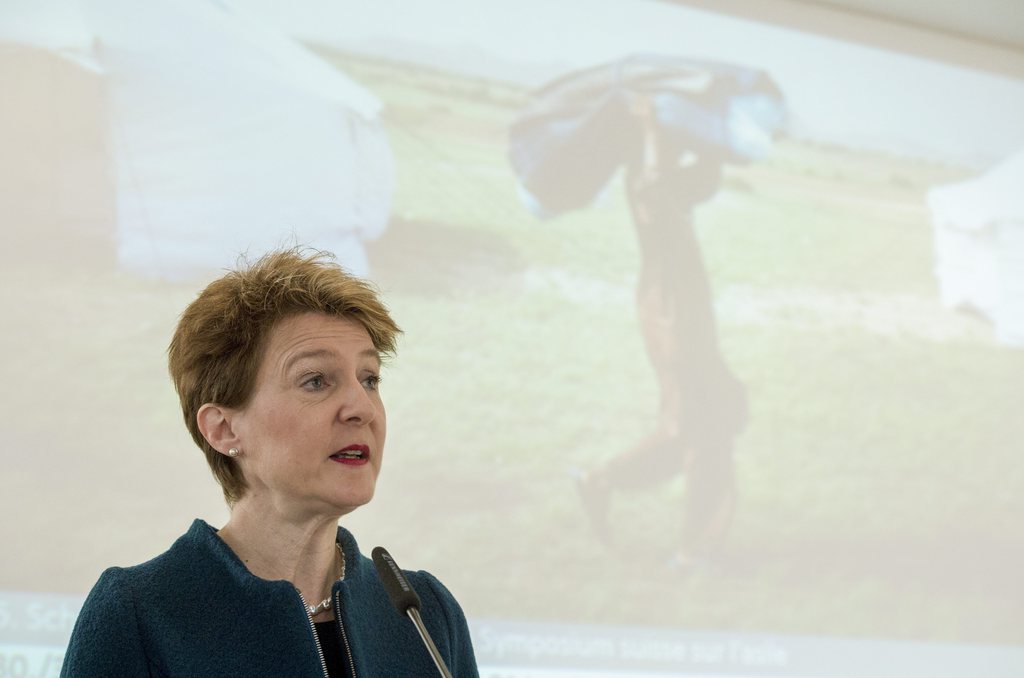Sommaruga concludes migration accords

On the final day of her three-country visit to Africa, Swiss Justice Minister Simonetta Sommaruga signed an agreement in Angola to deal with failed asylum seekers, similar to one concluded two days before with the Democratic Republic of Congo.
Under the accords, the two countries have agreed to accept back their nationals whose asylum application is turned down by Switzerland. But they also provide for broader partnership over immigration issues. In particular, the accords aim to encourage asylum seekers to return home voluntarily, according to a justice ministry statement on Wednesday.
Switzerland already had a similar agreement with Nigeria, which Sommaruga visited from Friday to Sunday. It includes a quid pro quo arrangement under which Switzerland helps the signatory countries with projects on the ground.
Unsuccessful asylum seekers from Nigeria have been offered a sum of money to help them create a future for themselves at home. Sommaruga visited three former Nigerian asylum seekers in a shop they have established with Swiss financial help, and also went to see a Swiss-supported job training project.
The number of Nigerians requesting asylum in Switzerland was 2746 in 2012, 45 per cent up on 2011.
This is the second greatest number (after Eritrea) of asylum seekers in Switzerland.
The Migration Office says the rise is because migrants have arrived from another European country, usually Italy.
Switzerland regards Nigerians as economic migrants: only one was granted refugee status in 2011.
In 2012 1428 Nigerians left Switzerland by air, most of them to another European country in accordance with the terms of the Dublin Agreement, whereby asylum seekers are returned to the country in which they first arrived.
Far fewer people from the Democratic Republic of Congo and Angola requested asylum: 85 and 227 respectively in 2012.
In addition to these three sub-Saharan African states, Switzerland has a similar agreement with Tunisia, reached in June 2012.
Greater cooperation
“It is important for Switzerland to have an agreement with stable relations with countries from which asylum seekers come to Switzerland,” Sommaruga told French-language Swiss radio on Monday, speaking from the Democratic Republic of Congo.
“We made this agreement with Nigeria two years ago, and it has turned out to be of benefit to both countries,” she told the radio.
“With my visit I wanted to stress that this migration partnership is very important for Switzerland. A few years ago it wasn’t possible to return failed asylum seekers to Nigeria. We can now do this again, and I can tell you that today cooperation between the authorities has greatly improved.”
But she admitted that not all problems can be solved with a migration agreement, given the size of the challenges. She said the agreements were not just about sending back asylum seekers, but also about looking for joint solutions.
During her visit to the Congolese capital Kinshasa, Sommaruga visited a Swiss-funded information centre which advises people about the dangers of illegal immigration. She also heard about a successful project providing vulnerable Congolese women – many of them rape victims – with micro-credit to give them a chance to make a living.
In a meeting with her Angolan counterpart, Rui Jorge Carneiro Mangueira, Sommaruga was told about the challenges facing Angola, including its own immigration problem, where several hundred thousand migrants are living without residence permits, particularly in the diamond-rich north-east of the country.
In addition to a number of ministerial meetings, during her visits to the three countries she also met members of national and international civil society, including non-governmental organisations and journalists, and discussed the challenges facing their countries, including human rights, people trafficking and press freedom.
Sommaruga returns to Switzerland on Thursday.

In compliance with the JTI standards
More: SWI swissinfo.ch certified by the Journalism Trust Initiative




You can find an overview of ongoing debates with our journalists here. Please join us!
If you want to start a conversation about a topic raised in this article or want to report factual errors, email us at english@swissinfo.ch.